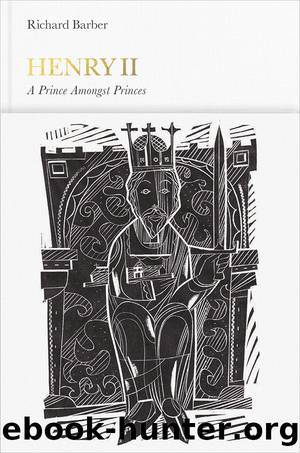Henry II (Penguin Monarchs) by Richard Barber

Author:Richard Barber [Barber, Richard]
Language: eng
Format: epub
ISBN: 9780141977096
Publisher: Penguin Books Ltd
Published: 2015-02-09T00:00:00+00:00
3
His Achievements
Henry created an empire of his own. He was King of England, overlord of Scotland and Ireland and much of Wales. In France he was overlord of Brittany, ruler of Normandy, Anjou, Maine and Aquitaine, the last through his marriage to Eleanor, and overlord of Toulouse. His power stretched from the furthest parts of the British Isles almost to the Mediterranean, and he overshadowed the French king in his own kingdom. Yet it was to prove an ephemeral wonder. There was no central administration, and no organized structure to it: what linked these wide lands together was the person of Henry himself. If he had any vision of its survival, it was as a kind of federation to be ruled by his heirs, with their relationship to each other as the binding force. His overwhelming desire to retain power in his own hands and the tensions and jealousies that resulted meant that the necessary relationships were never built in his lifetime. Richard’s absence on crusade and John’s incompetence further weakened this Angevin empire, and within two decades of Henry’s death, the relentless ambition of Philip of France had succeeded in regaining all of Normandy, Brittany and much of Aquitaine as the property of the French crown.
Remarkably, Henry had built this empire in the aftermath of civil war in England and Normandy, from the slender base of his father’s two counties of Anjou and Maine, and aided by a scattering of supporters elsewhere. What had enabled him to do this was the dire state of England under King Stephen, ravaged by civil war. Henry saw for himself, when he first came to England as a young man, what a disaster a weak king could be, and his passion for law, order and good government arose from his desire to ensure that this should never happen again. When, twenty years later, his sons and some of the great men of the realm rebelled, they were defeated, not by Henry himself, but by his deputies, men whom he had gathered about him who were prepared to support him against powerful enemies. He had chosen them wisely; unlike his grandfather, who employed churchmen in his government, Henry from the outset had sought out literate laymen to carry out his work, men with no other qualifications save intelligence and loyalty to the king’s aims.
With the help of such men, Henry’s great success lay in the legal and administrative matters of the English royal government. Here he built soundly and well. The English common law as we know it is firmly founded on what he established and his work also survives in the administration of English government.
The picture of Henry’s court as a place of lively discussion is the key to his method of working. Henry’s objectives, order and justice, were clear enough, and he did not adopt solutions based on theory in order to achieve them. The discussions were between some of the best-educated men in the kingdom, who were also directly involved in
Download
This site does not store any files on its server. We only index and link to content provided by other sites. Please contact the content providers to delete copyright contents if any and email us, we'll remove relevant links or contents immediately.
Blood and Oil by Bradley Hope(1567)
Wandering in Strange Lands by Morgan Jerkins(1430)
Ambition and Desire: The Dangerous Life of Josephine Bonaparte by Kate Williams(1394)
Daniel Holmes: A Memoir From Malta's Prison: From a cage, on a rock, in a puddle... by Daniel Holmes(1336)
Twelve Caesars by Mary Beard(1324)
It Was All a Lie by Stuart Stevens;(1300)
The First Conspiracy by Brad Meltzer & Josh Mensch(1174)
What Really Happened: The Death of Hitler by Robert J. Hutchinson(1167)
London in the Twentieth Century by Jerry White(1149)
The Japanese by Christopher Harding(1135)
Time of the Magicians by Wolfram Eilenberger(1131)
Twilight of the Gods by Ian W. Toll(1123)
A Woman by Sibilla Aleramo(1097)
Cleopatra by Alberto Angela(1096)
Lenin: A Biography by Robert Service(1080)
John (Penguin Monarchs) by Nicholas Vincent(1072)
The Devil You Know by Charles M. Blow(1029)
Reading for Life by Philip Davis(1027)
The Life of William Faulkner by Carl Rollyson(994)
